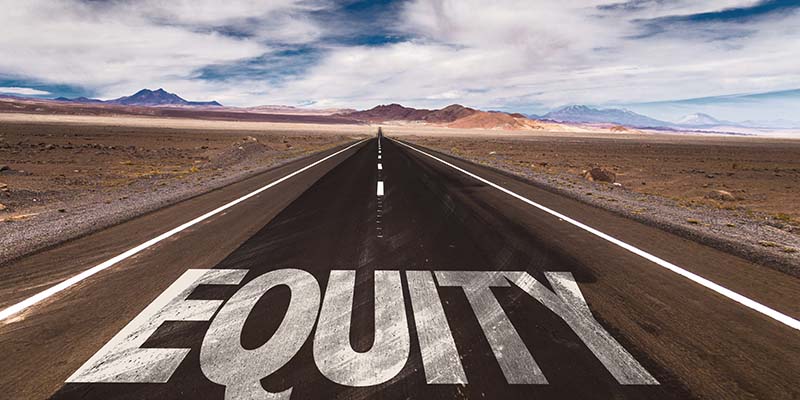It’s Time to Step on the Gas toward Greater Health Equity
Jenny Love
Published: 06/06/2022

Health equity is a hot topic today, as it certainly should be. The pandemic and social unrest of the past two years have uncovered cracks in the foundation of our society that threaten its stability—cracks that have been there for generations but were split wide open in the recent crisis. People of color have worse health outcomes on almost any measure you can think of, and the pandemic has widened the gap even further.
As healthcare fundraisers, we are in a unique position to start to fill in those cracks. We have access to the people and systems that elevate the community’s health through the organizations we serve, and we have the skills to bring the necessary resources to bear to enable those people and systems to work toward the greater good.
It’s a scary and almost egotistical to consider: how can I, little old me who can’t even seem to retrieve all my pairs of socks from the dryer intact, make a difference in a huge, entrenched social problem like systemic racism? It would be easy to throw up our hands in defeat at the enormity of it all, but the beauty of it is that none of us needs to solve it by ourselves.
This past Memorial Day I drove to the Outer Banks in North Carolina from our home in Maryland with my 16-year-old son, who was behind the wheel for the first time in the 80-mile standstill traffic that is par for the course on I-95 between Richmond and Washington. He impatiently wondered why everyone couldn’t just press the gas slowly at the same time and accelerate in one giant column of packed minivans and SUVs trailing kids’ bicycles and beach chairs.
Of course, that did not happen, but I think it's a great metaphor for getting started on our collective health equity journey. Even if we can only move our own car forward a little bit, if we all move our cars forward in the same direction at the same time, we can move a whole lot of people to the destination faster. This mindset takes the enormity of the situation (how can I solve systemic inequity?) and makes it much more manageable: what small step can I take in my community today that will add just a little bit of momentum toward our collective goal of better health for all?
There are many examples to look to for inspiration, and we’ll be presenting some case studies of foundations that have quite a bit of momentum at the AHP International Conference this fall. In the meantime, I’d like to share just one story that I hope might inspire you as to what is possible.
I had the pleasure of speaking with Mary Anne Chern, FAHP, ACFRE, Senior Consultant, Netzel Grigsby Associates, about her 25 years of health equity fundraising at Adventist Health White Memorial Hospital in Los Angeles. Among many other projects, Mary Anne and her team created a scholarship program to train culturally competent nurses to better serve the overwhelmingly Hispanic patient population at AHWM. The project has a virtuous-cycle quality that I find satisfying: the hospital foundation sponsors educational opportunities in the community (win) that turn into job opportunities for the community (win-win) that lead to better patient care for the community (is there such thing as a win-win-win?).
Increasing RN Cultural Competence and Community Employment at AHWM
by Mary Anne Chern, FAHP, ACFRE
In 2002 we initiated a health equity project to train and recruit culturally competent youth from our low-income Hispanic community to become RNs. Although the CHNA had identified a high unemployment rate in our community, the hospital had not previously considered how this community problem could lead to fulfilling a hospital need.
Our TELACU Education Foundation/AHWM Nursing Program linked two of the most highly respected local organizations to “connect the dots.” The community had: high unemployment as well as cultural, language, and financial barriers, which resulted in low-educational attainment among the low-income Hispanic students in East Los Angeles. Even students who wanted to attend college typically did not have the financial capacity to do so. On the other hand, the hospital had: high nursing turnover rates that negatively impacted the hospital’s operating budget and staffing model, as well as high-cost, Spanish-speaking (but not culturally competent) traveling nurses who did not stay at the hospital long term. The hospital’s ongoing attempts to hire Hispanic RNs were thwarted by the fact that nationwide only 8% of all RNs are Hispanic and therefore highly in-demand. Finally, we recognized a shared need: to educate and provide jobs to community residents who could provide culturally competent Registered Nurse care at a hospital where 90% of the patients were Hispanic.
For 20 years this health equity project has produced culturally competent nurses for our hospital and allowed young people to realize their dreams of becoming RNs and serving their community. AHWM’s innovative partnership with a community nonprofit organization to create a successful model for securing and retaining nurses from the local low-income, Hispanic community was specifically cited as evidence of “Citizenship with Results” when AHWM won the 2019 Malcolm Baldrige National Quality Award, a Presidential award widely recognized by hospital CEOs as “the highest level of national recognition for performance excellence that a US organization can receive.”4 Startup and operating expenses for the first four years were paid entirely by philanthropy. For the last 16 years the program has been financially sustainable from operational savings generated by reduced nurse turnover. Our connections through this program to the students and nursing schools also allowed us to provide Covid vaccinations when our community residents desperately needed them.
AHP members can read the full article, including Mary Anne’s practical tips for starting a health equity program at your own foundation, in the spring 2022 issue of Healthcare Philanthropy.